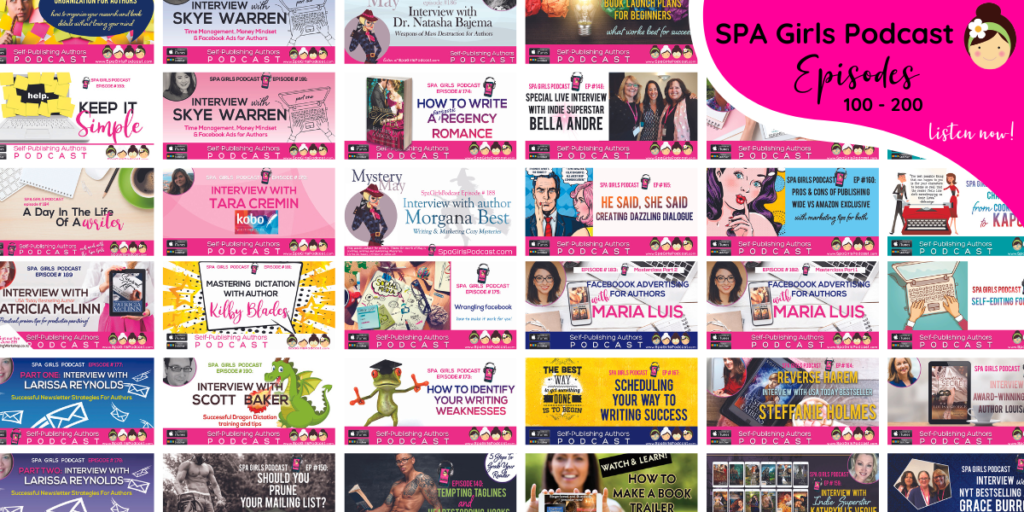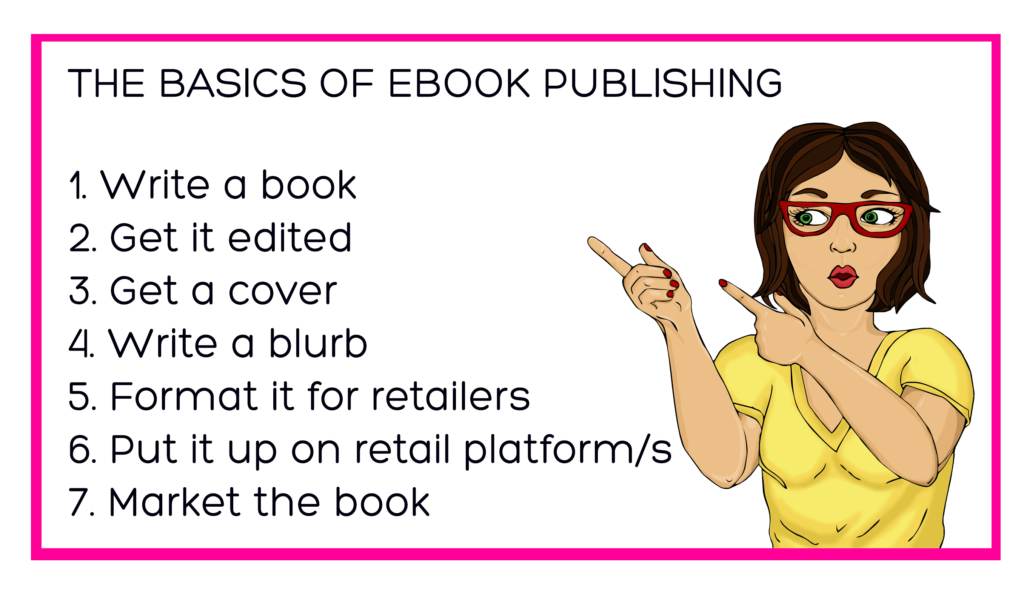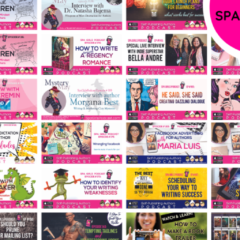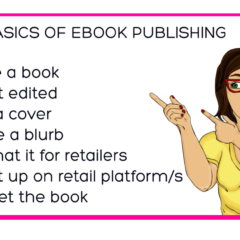SPA Girls Podcast – EP174 – How To Write A Regency Romance
Podcast: Play in new window | Download
Subscribe: RSS

This episode we talk to our very own Wendy Vella about writing Regency romance. Since 2013, Wendy has forged a very successful indie career writing historical and contemporary romance. Her Regencies have been on the Amazon’s top seller lists many times and collectively she’s sold over one million books to date.
Like many romance writers, Wendy cut her historical reading teeth on Georgette Heyer, and then discovered the wonderful worlds of Eloisa James, Stephanie Laurens, Julia Quinn and Lisa Kleypas (and many more!). Regency romance is a subgenre of varying heat levels and sensibilities – from sweet, comedy of manners novels, to the succulent, sensual Regencies that Wendy writes, through to Regency-set erotica, there are eager readers wanting these books.
So how to start? Wendy covers how she goes about researching her novels, the advantages of writing in a series and the elements that every aspiring historical romance writer needs to be aware of.
Wendy says:
-You must love the era you chose to write about. You cannot write about it if you do not, and why would you want to?
-First of all there is nothing like reading this genre to understand it. This I did, extensively before writing it. Authors I love: Julia Quinn, Eloisa James, Stephanie Laurens, Tessa Dare, Anne Gracie and so many more. Then of course I read the more traditionally accurate books by Georgette Heyer.
-I also had good research books that I found hugely helpful.
One was – What Jane Austen Ate and Charles Dickens Knew: From Fox Hunting to Whist-the Facts of Daily Life in Nineteenth-Century England
-I write fast, so I don’t like to stop for research, so what I do is put RESEARCH in capital letters if I need research done about something, then continue writing. Second draft I fill these gaps in.
-You can write about a fictitious character as long as the facts relating to people, and places of that era are accurate. Believe me readers will let you know if you get this wrong.
-Choose an exact time period, this will determine clothing food, setting etc, and will shape your characters as they will face different challenges to those characters in modern settings
-Don’t fill the book with historical facts, you are writing to entertain not bore your readers, unless you’re writing an encyclopedia or research book
-Remember to show and don’t tell. You may have done a lot of research but your readers don’t need to read all about it
-Try to understand the religion and attitudes of the time period. What the children’s role is etc?
-What did they talk about in those times, what were the big current events. War? Who were the important people, or discoveries being made, medical, botanical, industrial revolution. Were there disease, what about jobs?
-What were modes of transportation.
-Language, check to make sure certain words are in use, and weren’t discovered later.
Helpful Links
Wendy Vella’s Books: https://wendyvella.com/books.html
Research: https://www.amazon.com/Austen-Charles-Dickens-Whist-Nineteenth-Century-ebook/dp/B008O58KKK
Episodes 100 – 200 List

200 What we’ve learned so far…
199 Interview with Adam Croft – Mindset and Marketing
198 Find Your Sparkle – with Julie Schooler
197 Hack Your Muse – with Kelly McClymer
196 Public Speaking For Authors – with Alena Van Arendonk
195 The Magic Pill – with Laura Van Arendonk-Baugh
194 A Day In The Life Of A Writer
193 Keep It Simple
192 Interview with Skye Warren: Money Mindset and Facebook Ads
For Authors (Part Two)
191 Interview with Skye Warren: Time Management & Advertising
For Authors (Part One)
190 Dragon Wrangling with Scott Baker: secrets for
Successful dictation
189 Interview with Patricia McLinn: Writing by the seat of
Your pants
188 Interview with Morgana Best: Writing & Marketing
Cozy Mysteries
187 Interview with Geoff Symon: Wounds & Crime Scenes
186 Interview with Natasha Bajema, WMD for Authors
185 The Writer’s Detective with Adam Richardson
183 Facebook Advertising with Maria Luis ~ Part Two
182 Facebook Advertising with Maria Luis ~ Part One
181 Learn dictation with Kilby Blades
180 Interview with Brian Meeks, Mastering Book Descriptions
179 Interview with Tara Cremin, Kobo Writing Life
178 Interview with Larissa Reynolds – Newsletters Part Two
177 Interview with Larissa Reynolds – Newsletters Part One
175 Wrangling Facebook: How To Make It Work For You
174 How To Write A Regency Romance
173 How Do You Identify Your Writing Weaknesses?
172 Interview With Dan Wood, D2D
171 Interview With Serenity Woods
169 5 Goals You Need To Make In 2019
168 Jumpstart Your 2019 Marketing with 31 Quick To Dos for Jan.
167 Scheduling For Writing Success
166 Our 2018 Roundup
165 He Said, She Said: Creating Dazzling Dialogue
164 Interview with Steffanie Holmes: Reverse Harem
163 Interview with YA author Kelly St Clare
160 Amazon Excl v Wide – things to consider and how to market
159 Interview With Kathryn LeVeque
158 Some Like It Hot – Or Not. Heat Levels In Romance
157 Interview With Louisa George
156 The Kindness Factor: Helping You Achieve More and Stress Less
155 Editing
153 Characters: From Cookie Cutter to Kapow
152 Interview with Tina Dietz: Audiobooks
151 Interview with Grace Burrowes
150 Should You Prune Your Mailing List?
149 RWNZ18 Interview with Damon Suede & Geoff Symon
148 Interview with indie superstar, Bella Andre
147 Top Ten Traits for Success
146 Write Better Faster with Becca Syme
145 Newsletter Ninja Tammi LaBrecque
144 Looking After Your Creative Health
143 Interview with Carlyn Robertson from Bookbub
142 Personal Branding For Authors with Lauren Clemett
141 Ten Free Online Tools For Authors
140 Tempting Taglines & Heartstopping Hooks
139 Findaway Voices with Kelly Lytle
138 Get Your Writing Mojo Back
137 Interview with Toni Kenyon: facebook live & serials
136 Dealing with misinformation and change in Sp-ing
134 Interview with Kevin Tumlinson, Draft2Digital
133 Interview with Sara Rosett
132 Organization For Authors – how to keep track of your
research and book details without losing your mind
131 Interview with Ricardo Fayet of Reedsy
130 Critical Care: Leveraging feedback for success
129 Brand You
128 SAS Special: Interview with Johnny B. Truant & Sean Platt
127 Industry Insiders with Damon J. Courtney of Bookfunnel
& Christine Monroe of Kobo
126 SAS Debrief with Jami Albright
125 SAS Special: Interview with Michelle Spiva
124 SAS Special : Interview With Michael Anderle
123 Sports Psychology for Authors – Interview With Nate Vella
122 Using Sub Plots To Amp Up Your Writing
121 Interview with Scott King: Outlining Your Novel
120 Pen-names Pros, Cons and Possibilities
119 Reader Engagement with Nalini Singh
118 Writing the Small Town Setting
117 Handling Negativity and Naysayers
116 Tough Mindset Questions For 2018
115 Interview With Nicola Davidson: Sex and Sensibility
114 Tropealicious
112 Interview With Honoree Corder & Ben Hale: Write Like A Boss
111 Ten Health Hacks For Writers
110 Interview with Kathryn Burnett: Your Writing Audit For Future Success
109 Interview with Melissa Storm: What Readers Want
108 Interview With Zoe Dawson: Writing Across Genres
107 Interview With Dave Chesson, The Keyword King
106 Pros and Cons of Kindle Unlimited
105 Why YOU should do Nanowrimo
104 Ten Truths For New Self Publishers
103 Find 30 Minutes A Day EXTRA!
102 Your Christmas Presence: Maximizing the Holiday Season for Authors
101 The Writing Life: Interview with Katie Cross
100 100 Episodes! Retrospective with funny moments; changing AO title
Self Publishing 101

It really is this simple – and yes, it can seem overwhelming when you start – but over eight-plus years of podcasting, we’ve covered every single step of the above!
If you know what you want to find out more about, head on over to our search bar (right hand side of the page), type in the topic, and it’ll bring up all the relevant episodes!)
Otherwise, read on for the breakdown of the eight steps of self publishing, according to the SPA Girls…
Eight Steps to Self-Publishing your Book
Like many things in life, self-publishing is both extremely simple… and kinda complex. But the following article is our basic run-down of everything you need to know to successfully self-publish your book.
But first, to help untangle some of the unfamiliar terminology, here’s an old episode of the podcast where we take you through some of the jargon you need to know to understand self publishing. Just click the link to listen:
Understanding Self Publishing Jargon with the SPA Girls – EP176
THE EIGHT STEPS BROKEN DOWN
1. Write a book
The number one thing you need to do as an author is write. Write like the wind! Focus on getting your book finished, pushing through the saggy middle to that glorious finish line where you become a person who has finished a freaking book! (Also, well done if you’ve just finished, you’re among a small percentage of people who actually finish writing a book.)
THE HARD WORD ON WRITING
If you’re struggling to get to the end of your book because you’re re-writing the first three chapters over and over and are too scared to move on to the next bit, you’re never going to finish. If you’re trying to write the perfect novel on your first go, you’re never going to finish. If you’re too busy to write or you procrastinate and do everything else but writing… you’re never going to finish a book.
Bum in chair, fingers on keyboard. Get it done!
We’ve done many, many episodes about getting the writing done and writing craft on the podcast. Here are a few of our favorites to get you started:
Interview with Christie Craig – Never Give Up – EP96
Alessandra Torre – Making Your Books Addictive – EP407
All the Best Secrets of Story with Matt Bird – EP396
All About Writing and plotting books with Plottr – EP384
The Power of Writing Sprints in Getting the Words Down – EP347
How to Have Lightbulb Moments in Writing – EP373
2. Get it edited
The next step, once you’ve written that book, is editing. This takes several forms.
The first type of editing is self-editing. This is the drafting stage. You need to go back through your book at least once, if not more, and fix any plot and pacing issues you find. One great way to do this is to get a separate file and do a chapter by chapter one-sentence description of what happens, and then do a big-picture analysis of your book. You can then go through and fix all the grammar and spelling issues you find.
The next type of editing that you can do is send out your draft to a select group of readers, sometimes called beta readers. These readers can give you a sense of whether you’re on track, and can offer potential changes based on a reader’s perspective. Often authors will also use beta readers at the end stages once they’ve made all the changes suggested by their other editors. This can help find any final mistakes or inconsistencies. This could be friends or family or other authors, but make sure it’s people who read in the genre you’re writing in. With beta readers it’s often helpful to ask them to look at something in particular as they read, because they’re not usually professional editors, and won’t always know how to verbalise their issues with the book, if they have any.
Once you’re happy with your book, the next step is to hire a professional editor. This is vital.
Self-publishing is now a very competitive environment, and readers will punish you in the reviews on the publishing platforms for badly edited books. It might seem like an expensive investment when you’ve never even published a book, but you will find a good editor will take your book to the next level. It’s always worth the investment.
There are a couple of types of professional editing. First one is developmental editing, which is more of an overview of the whole story, the conflict, whether you’re meeting genre expectations, that kind of thing. It won’t usually be about the spelling and grammar.
The other type of editing is copy editing, which is about the grammar and spelling, the style, the writing prose, the sentence structure, and the smaller inconsistencies in your book like a character’s eye colour changing. Basically, more of the detail level.
There are also different names used by editors for the above two types of editing (for example: Substantive editing, Structural editing, line editing, manuscript assessment), so it’s important to talk to your editor and clarify exactly what kind of editing they will do for you. Sometimes an editor will do a little bit of developmental with a side of copy editing. Some might just provide an overview of where you could improve the story. Some might be really familiar with the crime genre and have never worked in romance. (Hint: if you have a romance book to be edited, go with an editor who is experienced with romance. Same goes for all the various genres.) Just be really clear about what your editor is providing before you agree to work with them.
The last stage of editing is proofreading, which some authors get as a last-ditch effort to get rid of any last errors. This is more of a quick skim over the manuscript, to find basic errors in spelling and grammar and anything else they notice. You could also get beta readers at this stage to help find any last errors.
THE HARD WORD
Editing is important. Do not skip this step. Even if you think you’ve got no money or you don’t need it because you’re awesome at English. You do need it.
We promise, this is an important step. I repeat, don’t skip it.
We’ve done several episodes talking all about editing, check them out via the links below:
Deep editing for Beginners with Louisa George – EP237
Essentials of Editing with Professional Editor Anne Victory – EP209
How to Self-Edit Your Second Draft – EP367
Top Editing Tips with Professional Editor Mary-Therese Hussey – EP342
3. Get a cover
The next stage is to get an amazing cover for your book. This cover isn’t for you. Don’t pick the cover that you love the best. It’s the cover that your READERS will love. Or that your readers will at least understand on a subconscious level. A book cover is a marketing tool.
Covers are an indication to readers about the type of book you have written. There are symbols in the covers that they may not even be aware of, but that they will immediately recognize. Think of a spaceship on a sci fi book, or a dragon on the cover of a fantasy novel, or a couple gazing into each other’s eyes on a romance. Readers know what the covers of books they love look like. Think of it like a code. You need to get this code right, or your book won’t sell.
THE HARD WORD
Covers aren’t about reinventing the wheel, especially when you first start out. They’re about fitting in, looking the same as the other books in your genre, so readers will recognize your book as being in the genre of books that they like to read. Again, a cover is a marketing tool.
We’ve talked to several cover designers on the podcast about the best covers for your books. Check them out here:
How to Get a Cover that Sells – EP330
Insights into Book Covers with designer Rebecca Haskell – EP224
4. Format Your Book for the eBook Publishing Sites
You need to create an .epub file for your ebook so you can load it to the various retail platforms like Amazon, Kobo, Barnes & Noble, Google Play, Apple Books, and others.
You can pay someone else to format it for you, you can do it yourself via software like Vellum (Mac computers only) or Atticus (for PC and Mac), or you can do it for free via Reedsy and Draft2Digital (which is a distributor that can send your ebook to a range of other retailers around the world).
It can seem overwhelming at first, but once you’ve done it a few times, formatting your book for the different platforms becomes a breeze.
When you format a book, you’ll need to have your manuscript, your cover, the front and back matter (such as a newsletter sign-up page, author bio, links to your newsletter, and copyright details). If you’re unsure about front and back matter, check out other authors’ ebooks to see what information they have at the front and back of their ebooks.
We’ve talked about formatting many times on the podcast, but check out these podcasts for more information:
Dave Chesson from Kindlepreneur and Atticus – EP352
Tweaks to Improve Book Sales with Leanna Morgan – EP374
5. Write a Blurb
The blurb is the description of your book that sits on the retail platforms like Amazon, Kobo, Barnes & Noble, Apple Books, Google Play and Draft2Digital. It’s sales copy, not a play-by-play description of everything that happens in your book. You’re trying to convince a reader that your book is one they’d love to read, so you need to intrigue, entice, and hook the potential readers in, in a very short space of time.
It’s one of the hardest pieces of writing you’ll do in your writing career. We’re so close to our books, we can’t step back and see the big picture again. In fact, we know a lot of authors who write the blurb before they start writing the book, so they can do it with a clear vision of the hooks. There are also people who make their living writing blurbs for authors, because it’s so hard to do! In the SPA, we always ask each other for feedback, and that’s a great way to get the blurb done – ask your author friends to help.
We’ve done several podcasts about writing an awesome blurb, check them out here:
The Power of Clever Copywriting with Jacob McMillen – EP310
Power Words That Will Level Up Your Writing – EP241
Write a Kick Butt Book Blurb with Glenna Mageau – EP75
Better Book Descriptions That Sell More Books with Brian Meeks – EP180
6. Put Your Book up on the Retail Platforms
This is the point at which the rubber meets the road. You have a decision to make first – do you want to be exclusive to Amazon, and go into their Kindle Unlimited programme, and not publish your books anywhere else… Or do you want to go wide, and publish on Amazon (but not in KU) as well as every other platform available?
There are authors with successful careers on both sides of the wide vs exclusive debate, so there’s no clear argument as to which is better. They’re just two different ways of publishing depending on your goals and the kind of books you’re writing.
Once you’ve decided, you can create accounts on the various platforms. You’ll need to know your bank account details and your tax information, as well as your personal information to set up the accounts. You can then follow the instructions to load your books on the platform/s and start selling books!
We’ve talked about wide vs exclusive, and loading your books on the podcast, check them out here:
What is Wide Versus Exclusive? – EP292
Publishing Wide with Erin Wright – EP391
Which is better – Wide or Exclusive? – EP160
7. Market Your Book to Readers
This is the piece of the self-publishing jigsaw that tends to cause the most trouble for authors. But marketing is simply telling readers who will love your book that it’s there for them to read. Most readers are looking for the next book (or to add something more to their TBR pile!) and will be happy to find you.
But the tricky piece of this puzzle is to find the right readers for your books. There’s no point telling hard core military sci-fi about your sweet rom-com. In fact, it’s likely to be detrimental.
Marketing is a big topic that includes advertising, social media, newsletter promos, newsletters, websites and so much more… We usually advise new authors to start simple, learn one or two basic marketing techniques and then move on from there.
We’ve done many, many episodes on marketing for authors. Check out the links below for some of our favourite podcast episodes.
What to do when your marketing isn’t working – EP410
Book Marketing Organization Made Easy – EP362
Book Launch Strategies For Authors – EP353
Marketing books that straddle genres – EP398
8. Write the next book!
Some people say the best marketing for your books is to write the next one. While we don’t necessarily think it’s that simple these days, there is some truth to the idea that you need to have more than one book to have a successful indie author career. The more books the merrier!
For many authors, their backlist is just as important as the latest release, and having many books in one series allows you to think about things like read-through and makes your marketing even more effective.
You’ll also become a better author the more books you write, and you’ll learn and gain experience as you go along. This is a marathon, not a sprint. As much as we’d like to tell you the stories surrounding newbie authors hitting it big, the chances of having a bestseller on your first book are very small. Even those authors where urban legend says (based on media reports) that they created a bestseller on their first book, a bit of digging will usually find a long history of writing, editing, and publishing in their background.
We’ve done many podcasts on writing the next book, check a few of them out here:
Bestselling Author Brenna Aubrey on Career Sustainability – EP394
Writing series with Lynn Rae Harris – EP401
Thanks for reading this article!
If there’s something that wasn’t covered in this article that you’d love to learn more about, head to the home page and use the search bar on the right-hand side. With over 400 episodes of the podcast, there will be something that covers your query! You can also find us on Facebook here.




